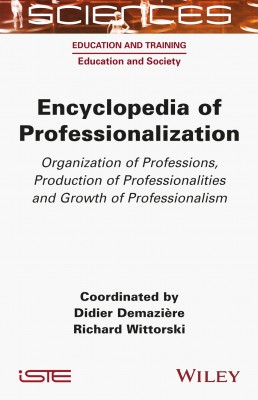
Professionalization has become a given in the worlds of work and education. For a wide variety of professions, public and private organizations and training and further education courses, professionalization is an inescapable reality. However, it takes on diverse, even contradictory meanings, according to what it represents: a managerial imperative imposed by public or managerial policies, or a set of goals defined by an ideal of service or quality of work.
The purpose of Encyclopedia of Professionalization is to discuss the current challenges facing professionalization and, by exploring major research traditions, to clarify the meanings associated with this concept and the various phenomena it encompasses.
Three major notions of professionalization are examined: the manufacturing of professions in pursuit of autonomy, the rise of professionalisms embodying notions of a job well done, and the construction of renewed professionalities at the very heart of work situations and training systems.
Part 1. Professionalization, the Manufacturing of Professions.
1. Professionalization, Practical Wisdom and Vulnerabilities, Florent Champy.
2. Professionalization: The Mystery of Boundaries, Didier Demazière.
Part 2. Professionalization, the Rise of Professionalisms.
3. New Requirements and Standards at Work: Driving Forces and Limitations to the Recomposition of Professional Autonomy and Responsibility, Arnaud Mias.
4. Struggles Over the Definition of a “Job Well Done”, Valérie Boussard.
5. Professionalization as an Object of Tensions between Institutional, Collective and Individual Logics, Mokhtar Kaddouri.
Part 3. Professionalization, the Construction of Professionalities.
6. Apprenticeship in Education and in Training: Foundation for Adult Training, Professionalization Analyzer of Educational Paths and Pedagogic Figure, Philippe Maubant.
7. The Relationships Between Professionalization and the Work Situation: Professional Challenges and Social Relationships, Sandra Enlart.
8. Learning in the Workplace: Recurrent and Emerging Conceptions and Practices, Stephen Billett.
9. The Activity Analysis Approach in Education and Training Sciences: Challenges, Principles and Perspectives, Joris Thievenaz.
10. Professionalism and the Auto/Biographical Imagination, Linden West.
Didier Demazière is Director of Research at CNRS and a member of the Centre de sociologie des organisations, Sciences Po, France. As a labor and professions sociologist, his research focuses on the organization of labor markets, compensation systems, professional careers and working and employment conditions.
Richard Wittorski is Professor and Director of the CIRNEF laboratory at the University of Rouen, France. He is also Director of the international Hybrida-Is research network, which focuses on social intervention activities and professions. His research focuses on the relationship between work and training and professionalization.